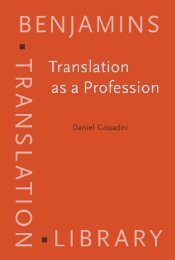Constructing a Sociology of Translation.pdf
Constructing a Sociology of Translation.pdf
Constructing a Sociology of Translation.pdf
- No tags were found...
You also want an ePaper? Increase the reach of your titles
YUMPU automatically turns print PDFs into web optimized ePapers that Google loves.
<strong>Translation</strong>s “in the making” 139(2004–2007) 4 is provided by the following Montréal-based companies: Fides,Boréal and Les Allusifs. Created in 1937 with an originally religious focus, Fidesis one <strong>of</strong> Québec’s oldest book publishers. Nowadays, it has a more generalist orientationand has released approximately 80 titles per year over the past ten years,including essays, fiction, children’s literature, c<strong>of</strong>fee-table books and referenceworks. <strong>Translation</strong>s account for 11% <strong>of</strong> the titles published. Founded in the earlysixties, Les éditions du Boréal is another well-established Québec literary publishinghouse. It has a team <strong>of</strong> some 10 full-time employees (as well as three personsworking as subcontractors on sales and promotion) and releases around 70 titlesper year. Initially specializing in Québec literature and historical writing, Boréalreleased its first translation in the late 1970s but only started to produce a number<strong>of</strong> translations – on a modest but more regular basis – in the 1990s. Since then,most <strong>of</strong> the translations produced under this imprint (an average <strong>of</strong> five per yearuntil 2005, when 15 foreign titles were released) have been works by Canadianauthors in the form <strong>of</strong> fiction and essays. Les Allusifs is a much smaller and morerecently created (2001) company releasing around 10 titles per year. Its catalogueis composed mainly <strong>of</strong> translations (around 75% <strong>of</strong> the titles released so far) andauthors from Africa, South America and Eastern and Western Europe writingin many different languages. The editorial line favours short novels (novellas) byauthors who enjoy literary recognition in their domestic market and who write, ina studied and polished literary style, stories dealing with usually dark issues (e.g.dictatorship, colonization, death).In studying one particular translation project in each <strong>of</strong> the three publishinghouses, I am working with three types <strong>of</strong> data. The first is the discursive type. Thesedata consist <strong>of</strong> comments collected during interviews with the actors participatingin the translation project: the managing director, editor-in-chief, translator(s),reviser(s), press <strong>of</strong>ficer(s), representative, etc. To analyse – over and above thediscourse – the practices themselves, I also collected two kinds <strong>of</strong> written data:(1) different versions <strong>of</strong> the translation corresponding to the distinct phases <strong>of</strong> itsdevelopment; (2) materials pertaining to management <strong>of</strong> the translation project(contractual documents, correspondence between the participants, limited-distributionpromotional brochures). In short, it is a matter <strong>of</strong> gathering the traces <strong>of</strong>the text in the act <strong>of</strong> becoming and <strong>of</strong> the paratext prior to publication. Lastly, thethird type <strong>of</strong> data involves the research notes taken throughout the process: fol-. This program, entitled Traductologie in the making and funded by the Social Sciences andHumanities Research Council <strong>of</strong> Canada, is linked to another three-year program, entitled “Traductionet réseaux: le rôle des intermédiaires dans le processus de fabrication d’une traductionen contexte éditorial” and funded by the Fonds québécois de la recherche sur la société et la culture.
















